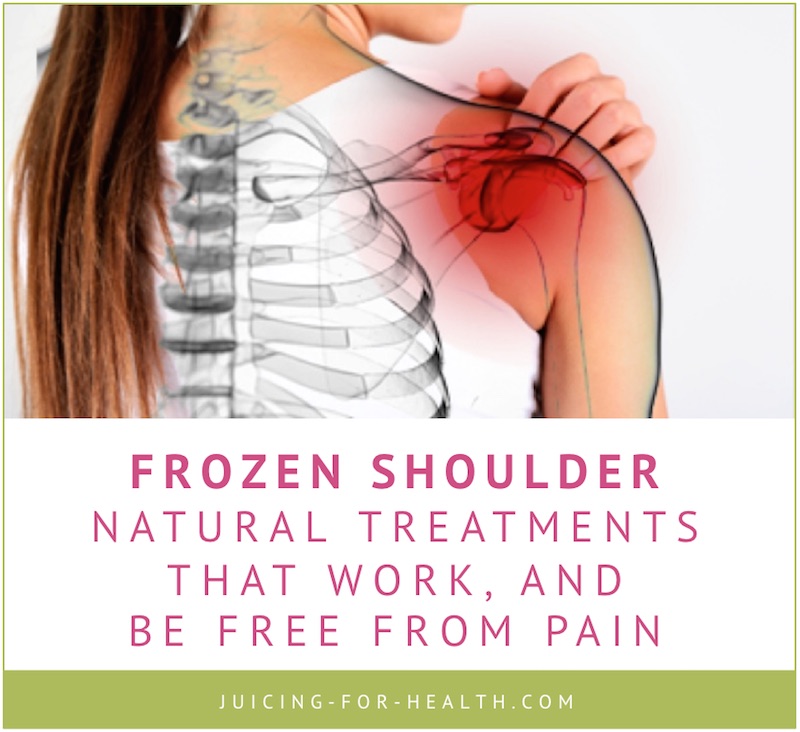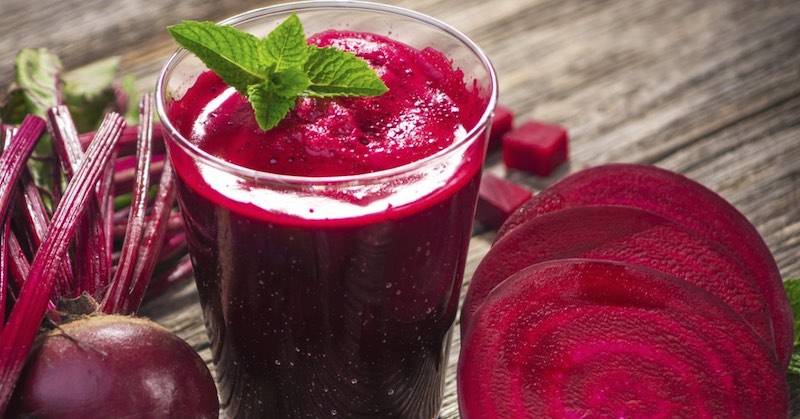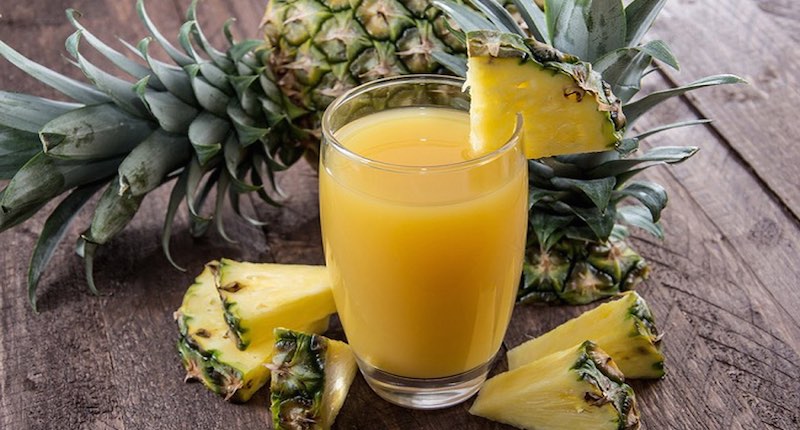Natural Treatments For Frozen Shoulder And Be Healed Within Days!
Last updated on
If you know anyone who has/had a frozen shoulder, you will know that they have tried almost everything that well-meaning friends have suggested.
Maybe you have experienced a frozen shoulder. Doctors may prescribe various medications, physiotherapy, steroid injections and even surgery for relief of pain. But really, natural treatment for frozen shoulder is the way to go!
What Is Frozen Shoulder?
Frozen shoulder (a.k.a. adhesive capsulitis) is an inflammation that occurs in the capsule of the humerus. The shoulder joint has a very loose joint capsule known as the articular capsule of the humerus and the connection tissue sometimes can become inflamed and stiff.
Frozen shoulder usually occurs to one shoulder at a time, rarely together. And when it happens, it can greatly limit the range of motion in the shoulder. Sufferers may experience certain tightness or stiffness and even pain in the shoulder that restrict movements.
Pain is constant, gets worse in the night or with cold weather. When left untreated, the condition doesn’t go away, and can get to the extent that you will not be able to lift your arm. Getting dressed, driving, and normal chores can cause severe pain in the shoulder.
Inflammatory Foods To Avoid When You Have Frozen Shoulder
Frozen shoulder is an inflammation of the humerus capsule and, just as with any other inflammation in the body, it can get better or worse depending on what you eat.
Here is a brief list of inflammatory foods to absolutely avoid when you have a frozen shoulder.
-
Sugar and refined carbs
Consumption of sugar (roughly one 330 ml can of soda) has been linked to a 60-109% boost in lab inflammatory markers, such as the C-reactive protein. The same is true for all refined carbohydrates.
Also, remember that sugar is the favorite “food” of all bacteria. If you have any kind of bacterial infection, eating sugar is very likely to worsen it (along with the related inflammation), wear down the resources of your body, and eventually worsen your frozen shoulder as well.
-
Trans fats
Trans-unsaturated fatty acids are among the worst things for your health in general, but things get even uglier when it’s a matter of recovery from inflammation.
Studies indicate that trans fats directly cause inflammation of the blood vessels and reduce their ability to relax and widen. Eventually, this decreases the blood flow to all organs in your body—this makes any inflammation much worse and significantly slows down frozen shoulder healing.
-
Alcohol
Alcohol consumption increases the flow of dangerous substances from the guts to the blood, such as microflora-derived lipopolysaccharides (LPS).
These have to be neutralized by the liver and flushed out by the kidneys, two processes that take a lot of energy from the body. Both factors significantly contribute to all possible inflammatory processes, including adhesive capsulitis.
-
Processed animal-derived foods
Animal-derived foods loaded with protein and fat are also rich in advanced glycation end products (AGEs), and they tend to form even more of those during cooking. This is important because AGEs have been linked to increased oxidation, worsened inflammation, and significantly boosted risk of such conditions as diabetes and cardiovascular disease.
If possible, do avoid all animal-derived foods during your treatment, especially if you’re dealing with severe frozen shoulder. If that’s not an option, follow these principles to minimize the formation of AGEs in your food:
- Opt for moist heat over dry heat to cook your foods
- Cook on lower temperatures
- Add acidic ingredients such as vinegar or lemon juice
-
Glutenous grains
Grains such as wheat, rye, and barley are also best to be avoided during periods of inflammation—and frozen shoulder is not an exception. These grains are rich in gluten and lectin, compounds that are known to cause dysfunction and disease in humans.
Even if you’re not gluten-sensitive, it’s a wise approach to avoid all possible dietary stress during periods of recovery from inflammatory conditions.
Related Reading: 20 foods that will make inflammation in the body worse.
Natural Treatment For Frozen Shoulder
Medications may relieve pain temporarily, but they don’t heal, in fact they may make the situation worse by creating other side effects such as inflammation in other parts of the body. And, you don’t want to have to permanently depend on painkillers. Surgery comes with its risk with no guarantee of complete healing.
The key word in this debilitating condition is “inflammation“. With inflammation, juicing always works. And knowing what juices to drink takes out the guess work and provides speedy healing.
Here are some of the things you can do to relieve frozen shoulder:
1. Improve your gut health
A very important and great place to start to prevent inflammation, is to focus on your gut health. A big part of your immune system is located in your gut, so it makes sense that the health of your digestive system is one of your main priorities for fighting inflammation.
The biggest problem that people face with their gut is a lack of healthy bacteria. This can be remedied by eating fermented foods, or regularly drinking green juices. A much easier way is that you could also consider taking a probiotics supplement.
Apple cider vinegar is a fermented drink that is easiest and most convenient to add to your diet that will help reduce inflammation significantly. Buy only Bragg’s apple cider vinegar that has its “mother” in it, which is the key to your healing.
2. Drink anti-inflammatory juices
One of the easiest natural remedies to stop inflammation is by drinking anti-inflammatory juices. This applies to many inflammatory conditions.
With a frozen shoulder, I can imagine that juicing would be a nightmare for you. You will need to get someone to make these juices for you.
Below are two of my favorite anti-inflammatory juice recipes. You can drink either one (or both) and they will give you good results. Drinking these in their juice form allows you to take in larger amounts of their goodness for the speedy healing of the inflammation in your shoulder.
BEETROOT JUICE
Beetroot is rich in betalains, ascorbic acid, carotenoids, phenolic acids and flavonoids that all contribute to a synergistic antioxidant and anti-inflammatory effects to reduce oxidative stress and chronic inflammation.
Juice all these:
- 6 large beetroots – cut off both ends and scrub clean under running water, juice with peel
- 1 lemon – cut off both ends of the lemon and quarter it, juice with peel
- 1-inch ginger root
This should make about 1 liter/quart of juice using a masticating juicer. If you use a high-speed centrifugal juicer, you may get a little less.
Caution: If you have never drank beetroot juice, start with a little beetroot juice to see how your body responds to it. If you experienced any reaction, drink plenty of water and drink a little less juice the next time and gradually work up the amount that your body is able to “tolerate”.
PINEAPPLE JUICE
Pineapple contains the bromelain enzyme that has analgesic (anti-inflammatory) properties. It is recommended for therapeutic use in the treatment of chronic inflammation and diseases. Not only is pineapple a natural painkiller, it also provides the right nutrients for healing of the inflammation.
Juice all these:
- 1 whole pineapple – cut off the crown and thorny skin, then cut the yellow flesh into smaller pieces to fit through your juicer chute
- 8-10 ribs of celery
- 1 cucumber
- 1-inch ginger root
- A pinch of cayenne pepper (optional but works to support your healing)
This should make about 1 liter/quart of juice.
HOW MUCH TO DRINK AND FOR HOW LONG
How much and how long you need to drink them, depends on how severe your frozen shoulder has become. Make 1 liter of juice every day and divide them into 3 portions to be drunk morning, afternoon and evening, on empty stomach, at least 15 minutes before food.
Caution: If you are diabetic, have low blood pressure, a blood disorder or yeast infection: Drink only about 500ml/day (about 17oz/day)—split into two portions for morning and afternoon.
Yes, you can continue to eat, but try to reduce foods that are inflammation-causing. Instead, eat foods that will help eliminate inflammation.
If you are on any medication, drink your juices 2 hours apart from medication.
After the first day, you may already feel some degree of improvement. That is how potent these juices are! Continue drinking the same on the second and third day.
How many more days longer? As long as it takes for YOU, until the pain totally subsides. For some people, it may take 3 days, for some others it may take up to 14 days. If you have suffered for months, a few days is really nothing when you know that you will get well by drinking these anti-inflammatory juices.
3. Magnesium to treat frozen shoulder
Another thing that could be the reason behind your adhesive capsulitis (or at least contribute to its development) is an inadequate intake of magnesium.
Magnesium deficiency is associated with increased risk of inflammation while proper intake prevents calcification of blood vessels and generally improves blood flow through the body.
In fact, some experts even affirm that magnesium is among the best treatments for frozen shoulder! Check out this list for foods that are rich in magnesium.
The best thing about dietary magnesium is that your body will absorb as much of the mineral as it needs, so you don’t have to worry about the specific amounts of each food to eat. Combine this with other natural therapies for treating frozen shoulder, and you can be sure to get some serious improvements in no time!
4. Acupuncture treatment for frozen shoulder
There are quite a few studies pointing to acupuncture as an effective treatment for frozen shoulder.
For example, a German trial from 2017 found that acupuncture brings instant pain relief in patients with severe frozen shoulder.
In the same study, it was noted that significant pain improvement was reached twice as fast in those patients who had received both acupuncture and conventional therapy (about 15 weeks) compared to those who had received conventional treatment alone (about 30 weeks).
What’s important is that acupuncture has virtually no side effects or dangerous long-term consequences compared to the conventional approach, which is based on non-steroidal anti-inflammatory drugs. Naturally, this makes acupuncture one of the best treatments for frozen shoulder—just make sure to find a trusted professional!
5. Herbal remedies for frozen shoulder
To speed up your recovery from a frozen shoulder, include in your treatment, anti-inflammatory herbs with analgesic properties that reduce inflammation and kill pain.
Some of the most effective options are:
- Reishi mushroom
- Devil’s claw
- Echinacea
- Thyme
- Rosemary
- Ginger
- Turmeric
Just by implementing some of the natural remedies suggested above, you can soon experience relief to your frozen shoulder.
Be well!
Some of the links I post on this site are affiliate links. If you go through them to make a purchase, I will earn a small commission (at no additional cost to you). However, note that I’m recommending these products because of their quality and that I have good experience using them, not because of the commission to be made.
Comments
Leave a Reply





































 JOIN OVER
JOIN OVER
Have you healed frozen shoulder with this diet?
Yes, this is the protocol I use with my clients with frozen shoulder, and also to relieve inflammation in other parts of the body.
Sounds good,any treatment for arthritis in the pelvic hip ,pain
I’m making the beet juice and it reduced my pain in half after the first day. Will keep trying this for awhile. I’ve had adhesive capsulitis before. God was kind to help me recognize the pain so I could start treatment early, and I was definitely encouraged by the results so far from the juice. Thank you.